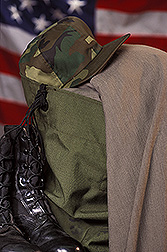This page has been archived and is being provided for reference purposes only. The page is no longer being updated, and therefore, links on the page may be invalid.
|
Read the magazine story to find out more. |
|
|
Future Fashions Made of Silky Smooth Wool?
By Jim CoreMay 11, 2005
Forget the "itch factor." A new "biopolishing" process developed by the Agricultural Research Service (ARS) makes scratchy wool feel silky and look whiter. Not only does it change the texture and appearance of wool, it also modifies the surface to make it shrink-proof.
Besides comfort and form, the method improves aesthetics, according to Jeanette Cardamone, a textile chemist at the ARS Eastern Regional Research Center in Wyndmoor, Pa.
The process results in an increased shine on the fabric's surface from the removal of projecting fiber yarn ends. This contributes to a smooth feel, which increases wool's appeal in women's fashions.
In biopolishing, the wool is pre-treated with a stable, activated peroxide, followed by a treatment with either serine or cysteine protease cellular enzymes.
The hydrogen peroxide step bleaches the wool at lower temperatures and in half the time as conventional techniques, which results in reduced processing costs, according to Cardamone. The bleaching technique also makes it easier to dye the wool.
Shrinkage in conventional wool occurs during machine washing because the resulting heat and pressure lock wool's scales in place. The wool is shrink-proofed by another step that uses enzymes to modify wool's surface by degrading its proteins with enzymes called proteases, so its scales no longer get tangled-up. Shrinkage is controlled without loss in strength or elastic recovery.
Wool scales are usually resistant to enzyme attack, but in biopolishing, enzymes "digest" the scales, resulting in a smoother surface.
Biopolishing can be applied to multiple surfaces--everything from loose fibers to yarn, fabric or completed garments. The American Wool Council, a division of the American Sheep Industry (ASI) Association, provided partial funding for the research.
The biopolishing process is being tested in woolen mills. There is already interest from the U.S. military in wool treated with the biopolishing process, especially for the manufacture of underwear for troops.
Read more about the research in the May 2005 issue of Agricultural Research magazine.
ARS is the U.S. Department of Agriculture's chief scientific research agency.

